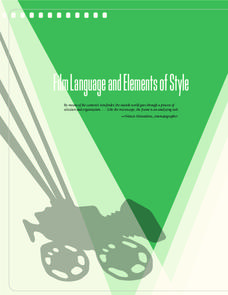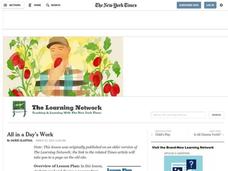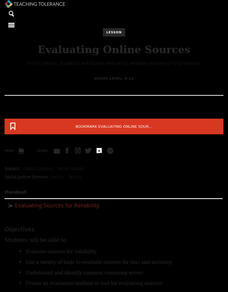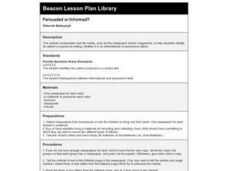ESL Kid Stuff
Past Tense Activities - Irregular Verbs: Part 2
The second part of a two-part lesson on irregular past tense verbs prompts language learners to add four more verbs to the list of twelve they have been working with.
Curated OER
The Times and Life During the California Gold Rush
Fourth graders read about the era in their history books, write in their journals revolving around the Gold Rush, making crafts such as newspapers, and also play the part of the Forty-niners.
Penguin Books
Using Thirteen Reasons Why in the Classroom
Thirteen Reasons Why by Jay Asher helps bring difficult, but important, topics such as suicide and bullying into the classroom. An educator's guide for the novel provides activities and discussion questions to help teens explore the...
Curated OER
Writing Summaries
Practice summary writing with informational texts. Young readers create summaries after reading magazine articles, newspaper articles, or other forms of informational texts. Readers use the GRASP strategy (read text, write what you...
Film Foundation
Film Language and Elements of Style
How do you read a frame? How do you read a shot? Here's a resource that shows viewers how to read films. As part of the study, class members examine the camera angles, lighting, movement, and cinematic point of view in Mr. Smith Goes to...
MENSA Education & Research Foundation
I Need a Superhero
Once the class learns about the hero's journey, they'll find it in every story and movie they see! Take characters from their humble beginnings to their atonement and apotheosis with a set of lessons about the hero's journey focusing...
Curated OER
The Learning Network: Re-envisioning Classic Stories
Readers reflect on enjoyable stories they know, brainstorm criteria that make a story "good," analyze a New York Times article about innovative children's performances, re-envision classics on their own, and peer edit drafts. Use this as...
Curated OER
All in a Day's Work
Who is Herman Melville? Read and discuss "Bartleby the Scrivener: A Story of Wall-street." Then, discuss the film adaptations of Melville's work and translate a passage of the text into modern-day English. Discussion questions are...
Curated OER
The Language Of Crime Newspaper Reporting
In this language of crime reporting worksheet, students read, write and discuss newspaper reports about crime, using fill ins, matching, and a crossword puzzle with notes for the teacher and an answer sheet.
Curated OER
Commas
Fifth graders discuss when a comma is necessary in a sentence. In this language arts lesson, 5th graders understand that commas are used as a pause and help the reader understand ideas better. Students find an example of each example...
Curated OER
Picture This
A unique writing lesson, this plan begins with learners talking about multiculturalism in small groups. Each learner will choose a picture from a newspaper, describe it to their small group, and think about how it relates to...
Smithsonian Institution
Art to Zoo: Life in the Promised Land: African-American Migrants in Northern Cities, 1916-1940
This is a fantastic resource designed for learners to envision what it was like for the three million African-Americans who migrated to urban industrial centers of the northern United States between 1910 and 1940. After reading a...
Curated OER
Opinion through the Ages: Exploring 40 Years of New York Times Op-Eds
What is the role of a newspaper's Op-Ed page? High schoolers explore the New York Times' "Op-Ed at 40," an interactive feature that lets them browse through 40 years worth of op-ed features, and consider the purpose and value of this...
Teaching Tolerance
Evaluating Online Sources
Newspapers, television, social media ... how do people get their news? Using the informative resource, scholars locate and verify credible sources of information. Working in small groups, they discuss strategies for evaluating the...
Curated OER
Don't Lose Your Way in the News
Students explore language arts by participating in a newspaper analysis activity. In this journalism instructional activity, students identify how newspapers present stories, who is writing them and how they can obtain information from...
Curated OER
School-Home Links/Book Links
Get youngsters reading at home and their parents involved with this at home reading assignment. This resource consists of a ready-to-use handout for documenting at-home reading. Formatted as a letter home to parents, this activity calls...
American Press Institute
Creating a Classroom Newspaper
Hot off the press: a mini-unit for class members to create their own newspaper. Complete with graphic organizers, extension activities, and helpful learning targets that teach parts of a newspaper, the resource contains everything needed...
Curated OER
Persuaded or Informed?
Give each learner a newspaper for this activity! As a group, read select editorials and discuss them with your class. Are these articles informational or persuasive? Cut out select editorials and have learners identify the purpose of...
Fluence Learning
Writing an Argument: Free Speech
How do you assess whether pupils have mastered certain concepts and skills? Designing a performance task that asks learners to demonstrate their skills and providing writers with a rubric that identifies these skills and provides...
American Press Institute
Media Literacy: Where News Comes From
What actually happens at a press conference? Make sense of the mayhem with a mock press conference activity designed to promote media literacy. Individuals participate as either members of the press or the governor's office to examine...
Curated OER
Political Cartoons: Literacy
Readers decode and deconstruct political cartoons to heighten critical thinking, extra-textual literacy, and making meaning from symbolism and metaphor. A compatible activity to use in English class when your 8th or 11th graders are...
Curated OER
Meaty Words
Headlines from newspapers launch a discussion of image-rich, meaty words. Just as headline writers choose vivid vocabulary to attract readers, young writers develop headlines that capture the essence of a passage from a book they are...
Curated OER
Picture Your Future Self
Students research careers using the internet and newspapers. As a group, they create a newsletter about careers of the future.

























